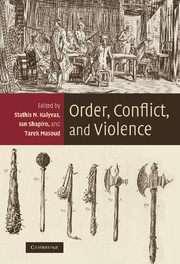1 - Introduction: integrating the study of order, conflict, and violence
Published online by Cambridge University Press: 06 July 2010
Summary
There might appear to be little that binds the study of order and the study of violence and conflict. Bloodshed in its multiple forms – interstate war, civil conflict, crime – is often seen as something separate from, and almost unrelated to, the domains of “normal” politics that constitute what we think of as order. Students of political, social, and economic institutions simply assume that violence is absent and order established, never considering that the maintenance of such institutions might involve the ongoing management of conflict and the more or less direct threat of violence. Likewise, students of violence and conflict tend to focus on places and periods in which order has collapsed, rarely considering how violence is used to create order at the national and local levels, maintain it, and uphold it in the face of challenges. In Charles Tilly's (1975, 42) famous formulation: war makes states. Clearly, order is necessary for managing violence as much as the threat of violence is crucial in cementing order.
Yet the question of how order emerges and how it is sustained is but the flip side of understanding the dynamics of conflict. On the one hand, order requires the active taming of conflict. However, this is often impossible without an actual or threatened recourse to violence. In game-theoretic language, violence is off the equilibrium path of order. On the other hand, violent conflict entails the successful contestation of existing order, and its collapse.
- Type
- Chapter
- Information
- Order, Conflict, and Violence , pp. 1 - 14Publisher: Cambridge University PressPrint publication year: 2008
References
- 5
- Cited by



